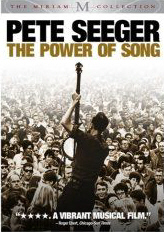

| |
| About Pete Seeger |
| Appleseed & Pete |
| Pete on Appleseed CDS |
| Pete and Bruce Springsteen |
| A Nobel Prize for Pete? |
| New Movie: “Pete Seeger: The Power of Song” |
| Links |
| Home |
![]()
"Pete Seeger: the Power of Song"

As one of the most influential musicians and sociopolitical activists of our time, Pete Seeger has captured the attention of more than one filmmaker. There are already a plethora of documentaries focusing on or including the modest folk icon; some recent DVDs include Tim Brachoki’s “If I Had a Hammer: Pete Seeger and the American Quest for Justice”; Martin Scorsese’s “No Direction Home” documentary about Bob Dylan, in which Pete dispels the folk myth that he was looking for an axe backstage to cut the cables powering the amplifiers of Bob Dylan’s electric back-up group (mostly the Paul Butterfield Blues Band) at the 1965 Newport Folk Festival; and the long-awaited DVD version of Murray Lerner’s “Festival!” documentary, which includes Newport footage shot between 1963 and 1966, and “Woody Guthrie – This Machine Kills Fascists,” centering on one of Pete’s few predecessors on the national folk music scene. Now making the rounds of film festivals, fundraising events and PBS stations is director Jim Brown’s “Pete Seeger: The Power of Song,” a 93-minute documentary that follows Seeger from his McCarthy-era blacklisting to his receipt of a Kennedy Center Award from then-President Bill Clinton. Music critic Joel Selvin of the San Francisco Chronicle wrote in his review of the film, “Seeger is one of the most astonishing individuals in American music and an inevitable subject for a PBS-styled documentary. All the requisite talking heads pop up – Dylan, Springsteen, Baez – but it is Seeger himself who towers over the landscape. . . . it is hard not to be awed by this gentle, resolute soul because of the ideas he steadfastly and faithfully represented.” New York Times critic A.O. Scott wrote, “. . . Mr. Brown’s documentary reminds us, with admirable thoroughness, why we shouldn’t take Pete Seeger for granted. He is, for one thing, more complicated than he might seem at first, much in the way that the folk music he adores reveals hidden nuances beneath apparently simple stories and tunes. It’s true that, in his performances, he suppressed some of those nuances, especially when they touched on matters of sex, murder or religion, but he also did an awful lot to popularize and preserve the beauty and strangeness of the American musical vernacular.” So keep an eye on your local movie and TV listings and video rental stores – “The Power of Song” is not to be missed.
|